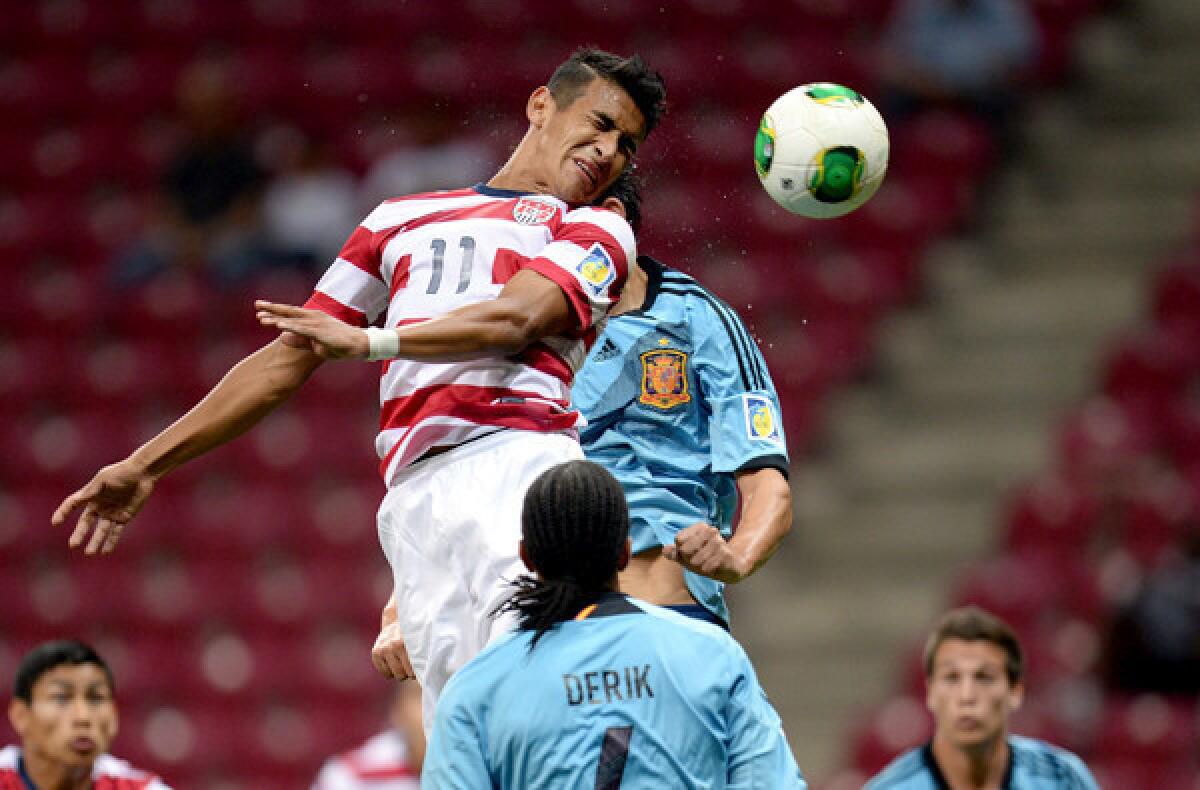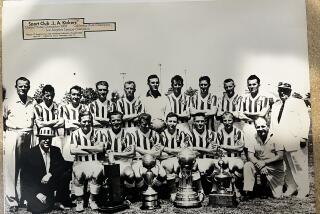U-20 team can be a steppingstone for U.S. soccer players

The last time the U.S. made it past the group stage in the U-20 World Cup, it had a roster sprinkled with players — guys such as Jozy Altidore, Michael Bradley, Robbie Rogers and Freddy Adu — who would go on to make a name for themselves on the senior national team.
Which is kind of the point of having a U-20 national team, said Tab Ramos, who coached the U.S. in last week’s age-group World Cup in Turkey.
“This is why it’s so important for these players,” he said. “Their next step from here is possibly, if not the Olympic team, the senior national team. And they can approach the rest of their international careers with a lot more confidence.”
Actually the next step Ramos’ players took was in the direction of the airport once his team was bounced from the event after going winless in three games. But that’s not as deflating as it might seem because the Americans’ first two games were against World Cup co-favorites Spain and France — and they played France to a draw.
But what those players accomplished in the tournament — and they all hope it will eventually catapult them on to the national team — can’t be completely measured on a scoreboard.
“What we’re gaining is more experience,” said Ramos, who played for the U-20 team in 1983 and went on to participate in three senior World Cups. “There’s no question that there will be something valuable coming out of this, regardless of the scores.”
Many of Ramos’ players said their careers had changed before they arrived in Turkey. Forward Jose Villarreal scored three goals and made the all-tournament team in the regional qualifying event in Mexico, where the U.S. took the host country to overtime in the title game.
“Playing the final against Mexico in Mexico in front of like 50,000 fans, it’s an experience I’ll never forget,” said Villarreal, who is the son of Mexican immigrants and grew up playing in the parks and school yards of Inglewood.
Villarreal’s day job is with the Galaxy of Major League Soccer, where he plays with U-20 teammate defender Oscar Sorto. Villarreal made his MLS debut last summer as an 18-year-old, playing the final minute of a win at Portland. Four days later he came on late in the second half and scored at Vancouver on his first MLS shot.
“I feel blessed. A lot of kids would want to be in my shoes,” Villarreal said.
The challenge now is make sure that gratitude doesn’t become complacency.
“That’s definitely an issue with a lot of players. And I hope it’s not with me,” he said. “I just want to keep on pushing myself to be a better player.”
Galaxy Coach Bruce Arena, the most successful manager in U.S. national team history, says for Villarreal that development is more likely to come with his professional club, where he is pushed by teammates such as Robbie Keane and Landon Donovan, than with an age-group team where he is among the best players.
“Those age competitions, they don’t necessarily translate as much as you’d like to think,” Arena said. “But they’re good for young players. When you taste success in those kinds of competitions, it’s good for your confidence.”
If the U.S. U-20 team didn’t taste victory in Turkey, though, that doesn’t mean it didn’t sample success. Going out in the group stage is actually an improvement from two years ago, when the Americans didn’t qualify for the tournament. And the 2001 team, which included future national team stars Donovan, DaMarcus Beasley, Edson Buddle, Brad Evans, Bobby Convey and Oguchi Onyewu, did only slightly better, losing its first game in the round of 16.
But if your definition of success is experience and growth, then the U-20 program has been very successful.
“Obviously these are young players. So for them to have confidence is very important,” Ramos said. “And I think as they have confidence they experiment more and try more things and they see what works and what doesn’t work and how far they can push their own limits in the game.”
Ramos isn’t the only one who thinks the best way to build a senior national team is to recruit and develop young U.S. players. El Salvador called up five Americans (who are dual citizens) for its U-20 team, while Mexico called up three, including Chivas USA forward Julio Morales, who was born in Glendale, and FC Dallas keeper Richard Sanchez from Mission Hills.
“The unfortunate part for us is that we only have a month with this group. And then they move on,” Ramos said. “But one of the things we stress is the fact that guys who have done well…in the senior national team, a lot of these guys were very successful at the U-20 tournament.
“That’s one of the things that we like to identify with. The players here, if they’re going to put a stamp on the game and they’re going to become somebody in U.S. Soccer, certainly the easiest way to do it is by doing well here.”
twitter.com/kbaxter11







